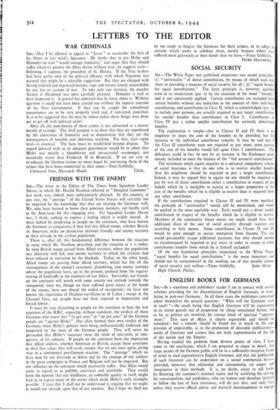FRIENDS WITH THE ENEMY
SIR,—The letter to the Editor of The Times from Squadron Leader Skeate, to which Mr. Harold Nicolson referred in "Marginal Comment" last week, was, indeed, most unfortunately phrased. In this country, at any rate, the " prestige " of the United States Forces will certainly not be impaired by the knowledge that they are treating the Germans well. We, who have learned to know their generous instincts, can hardly cavil at the Americans for this engaging trait. Yet Squadron Leader Skeate was, I think, seeking to express a feeling which is widely shared. It must indeed be perplexing to people on the continent, who have known the Germans as conquerors, if they feel that Allied troops, whether British or American, make no distinction between friendly and enemy territory in their attitude to the civilian population.
There is, after all, this fundamental difference between the situation in 1919, which Mr. Nicolson described, and the situation as it is today. In 1919 British troops passed from Allied territory, where the population was relatively well fed, into enemy territory in which the civilians had been reduced to starvation by the blockade. Today, on the other hand, Allied troops are passing from Allied territory, which has felt all the consequences of the enemy's systematic plundering, into enemy territory where the population have, up to the present, profited from the requisi- tioning of foodstuffs in the countries of our Allies. Inevitably, our friends on the continent will watch with some anxiety our attitude towards the conquered, since we, though we have suffered great injury at the hands of the enemy, have not shared the ordeal of occupation ; we have not known the experience of Oradour-sur-Glane or of Lidice ; except in the Channel Isles, our people have not been exposed to deportation and forced labour.
It must be very disturbing to people on the continent to hear the war reporters of the B.B.C. repeating, without comment, the verdicts of those Germans who assert that "75 per cent." or "go per cent." of the German people are "against Hitler." Our allies formed their own verdict of the Germans when Hitler's policies were being enthusiastically endorsed and supported by the mass of the German people. They will never be persuaded that Hitler's successes were the work of one-sixth, or one- quarter, of his subjects. If people on the continent form the impression that Allied soldiers, whether American or British, accept these assertions at their face value, they will easily assume that we are, once again, giving way to a, sentimental pro-German reaction. The " prestige " which we have won by our fortitude in defeat and by the courage of our soldiers in the great campaigns in France and Belgium will not be impaired. But our influence on the continent would necessarily suffer. Our Allies would come to regard us as gullible, uncritical, and unreliable. They would form the opinion that our kindliness, an estimable quality in itself, might lead us to repeat many of the errors which made Hitler's early triumphs possible. I trust that I shall not be understood as arguing that we ought to model our attitude upon that of our enemies. But I hope we shall not be too ready to forgive the Germans for their crimes, or to adopt attitude which seems to condone them, merely because others h, suffered more grievously at their hands than we have.—Yours faithfully. PETER MATTHEWS.


























 Previous page
Previous page